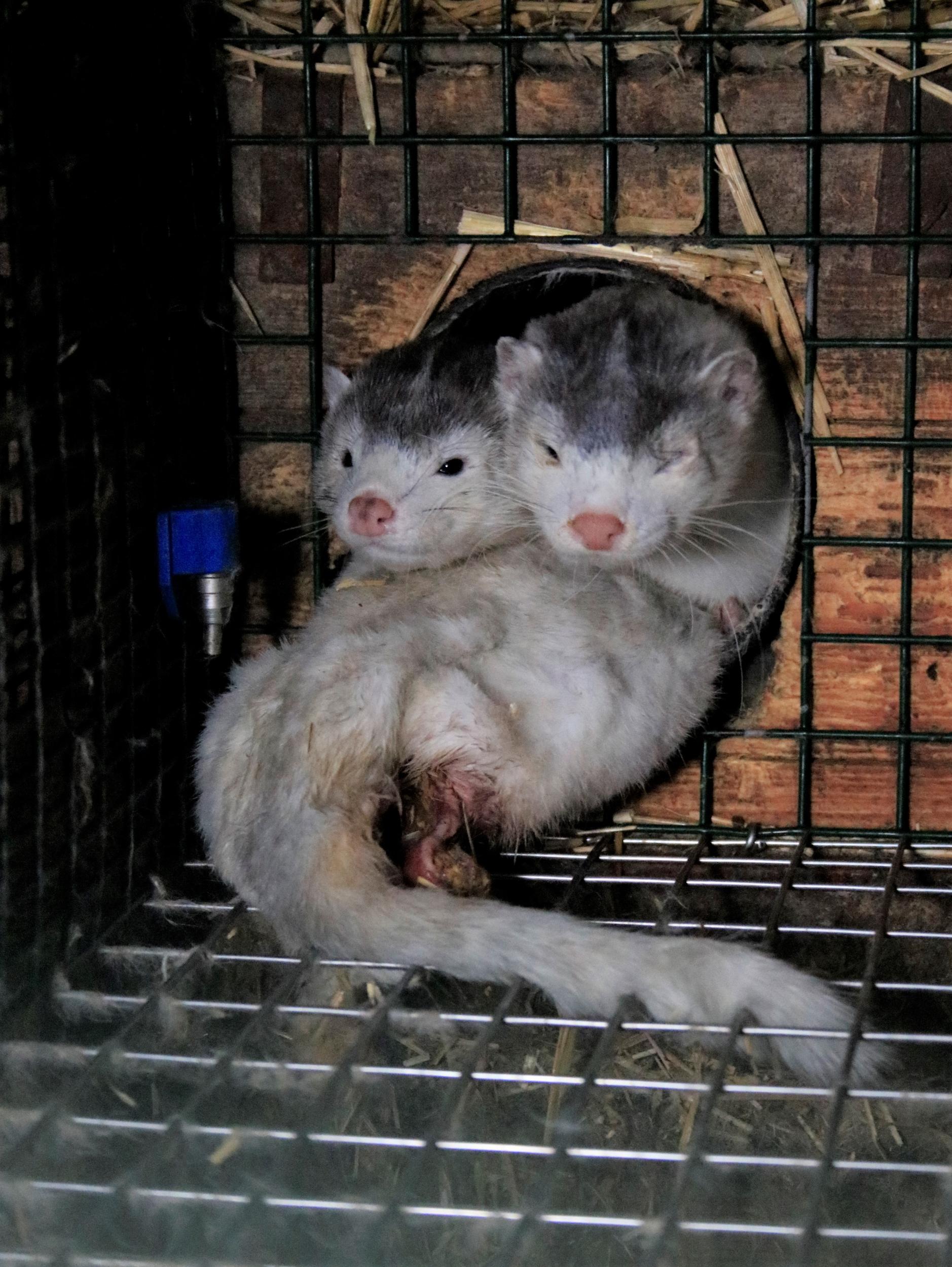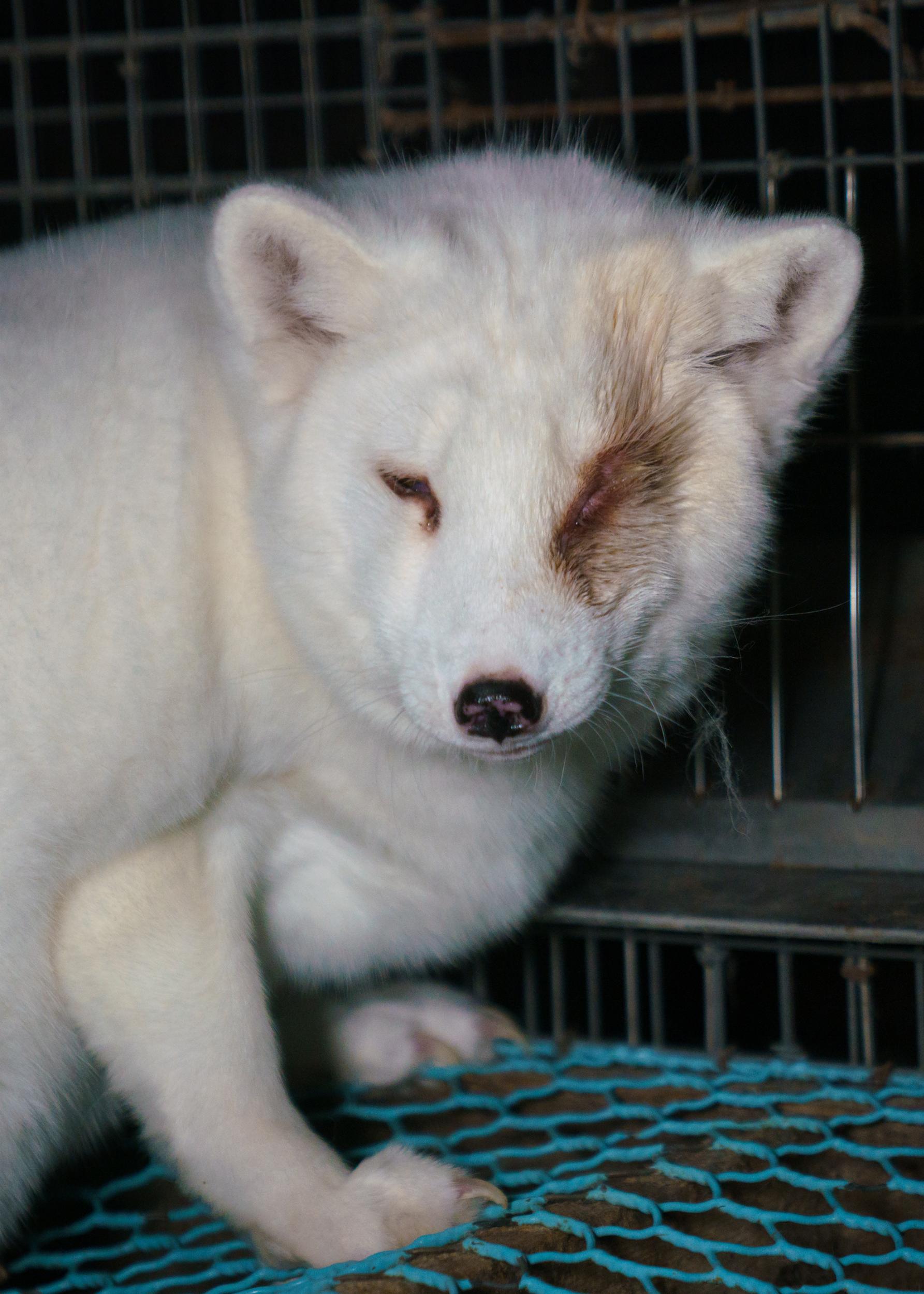Caged animals resort to cannibalism on ‘high welfare’ fur farms linked to Britain’s most upmarket brands and sellers
'It’s a massive double standard that the UK is outsourcing to countries like Finland the very cruelty we banned'
Your support helps us to tell the story
From reproductive rights to climate change to Big Tech, The Independent is on the ground when the story is developing. Whether it's investigating the financials of Elon Musk's pro-Trump PAC or producing our latest documentary, 'The A Word', which shines a light on the American women fighting for reproductive rights, we know how important it is to parse out the facts from the messaging.
At such a critical moment in US history, we need reporters on the ground. Your donation allows us to keep sending journalists to speak to both sides of the story.
The Independent is trusted by Americans across the entire political spectrum. And unlike many other quality news outlets, we choose not to lock Americans out of our reporting and analysis with paywalls. We believe quality journalism should be available to everyone, paid for by those who can afford it.
Your support makes all the difference.Mink, foxes and raccoon dogs have been filmed resorting to cannibalism and suffering painful wounds at a “heartbreaking” fur farm endorsed by a supplier linked with some of Britain’s most expensive luxury brands and sellers.
Investigators say they found “deplorable conditions and distressing animal suffering” at two centres in Finland certified by fur industry chiefs as “high welfare”.
They revealed their findings to pressure UK government ministers to ban imports and sales of real fur to close a legal loophole.
Shoppers who search online for coats, jackets and other clothing and accessories made of mink for sale in Britain are faced with a choice, costing up to £19,500, with the same supplier “high welfare” certification. A short mink jacket can be bought for £3,500.
One seller said there was “absolutely no evidence” that the fur on its clothing or accessories came from the farms filmed. But the investigators said the farms, chosen at random, indicated standards in the industry.
The footage taken last month, at a fur centre where an estimated 12,000 mink are housed, shows foxes with “deformed feet and diseased eyes, and mink with open infected wounds, some even driven to cannibalism”, according to Humane Society International (HSI).
The investigators said they saw a “bloodied, wheezing” animal being gnawed at by its cellmate.
Four mink lay dead in their cages and others showed signs of injuries including missing eyes, lacerations, cuts and bloody noses, according to one witness.
Britain banned fur farming in 2003 on humane grounds, but since then almost £700m of fur has been imported, including £14m worth from Finland. Much of it comes from China, the US, France, Italy and Poland. Last year alone the UK imported almost £75m of animal fur.
HSI UK is calling on environment secretary Michael Gove to stop the “double standard” and ban fur sales, just as the US cities San Francisco, Los Angeles, West Hollywood and Berkley have done.
Claire Bass, director of HIS UK, said: “Seeing first-hand these animals mentally broken and even driven to cannibalism has been utterly heartbreaking. In their tiny barren cages these animals have zero quality of life, they merely exist as shadows of the wild animals they should be.
“It’s sickening that the fur trade still attempts to justify this blatant animal suffering, and we hope our investigation will encourage designers still using this fur to see through the travesty of so-called ‘high-welfare fur’.
“The British government needs to take action to ensure the UK plays no further part in bankrolling this cruel and unnecessary trade.

“It’s a massive double standard that the UK is outsourcing to countries like Finland the very cruelty we banned here. There have been so many fur farm investigations over the years exposing exactly the same kind of suffering, which is endemic in the fur industry.”
Experts said keeping the animals in wire-mesh cages causes permanent physical and psychological trauma.
But the certification group claims to produce “the highest level of animal welfare”.
At another farm, housing about 2,000 silver foxes, racoon dogs and arctic foxes, the investigators said they saw animals showing signs of overfeeding – a tactic used to increase the amount of fat and fur on each one.
Former Defra vet Professor Alastair MacMillan said: “It is appalling to see the suffering endured by these animals. There is nothing ‘high welfare’ about the extremely small barren cages the animals are confined to, unsuitable for these intelligent wild animals who would normally roam many kilometres in a day.
It makes no sense that we banned fur farming here and are now paying farmers to keep wild animals in tiny cages for a product nobody needs
“The footage shows the toll that the continued isolation and confinement is having. Many animals show signs of severe distress. Several have open, infected wounds or grossly diseased eyes which will be extremely painful. If this is the best the fur industry can offer, no wonder so many designers, retailers and now cities no longer want anything to do with it.”
An increasing number of fashion designers and retailers are dropping fur. This year alone Gucci, Versace, Michael Kors, Jimmy Choo, DKNY, Coach and Burberry have announced fur-free policies. London Fashion Week also made history with its first ever fur-free event.
A lack of labelling confuses many shoppers, who think they are buying fake fur and are misled into buying real.

Fur farmers must follow recommendations made by the Council of Europe on welfare. The guidelines say: “Where there is a significant level of stereotypy [repetitive behaviour] or self-mutilation in mink on a farm, the system of housing or management shall be changed appropriately so that the welfare of the animals is improved. If these measures are not sufficient production should be suspended.”
But the investigation found many signs of violence among the caged animals.
The fur supplier said it instructed the farmers to arrange for vets to visit both farms after the footage was taken.
It also said the injured animals had already been “identified by the farmer as sick or injured, had been therefore isolated from healthy animals and were being treated, or due to be treated”.
Finland, which has about 900 fur farms, is the biggest provider of fox fur in Europe, rearing and electrocuting an estimated 2.5m foxes every year to sell their pelts worldwide.
It should also be possible to trace the origin of a pelt but a 2014 Norwegian government report stated: “The buyers usually do not know which fur farmers the skin comes from.”
British MPs debated a ban on fur imports in parliament in June after a petition started by HSI UK collected 100,000 signatures, with many passionately supporting an import and sales ban. But the idea the government dismissed the idea, saying that “national bans are less effective than working at an international level on animal-welfare standards”.
The Environment (EFRA) select committee then recommended the government hold a public consultation on banning fur sales.
Tory MP Zac Goldsmith also called for a consultation, saying: “It’s a disgrace animals are still treated like this. It makes no sense that we banned fur farming here and are now paying farmers to keep wild animals in tiny cages for a product nobody needs.”
Labour has pledged to ban fur imports and require real fur to be clearly labelled.
Ms Bass said several labels sold in the UK buy fur from farms under the certification scheme that claims high welfare. “We wanted to see what high welfare actually looks like, and the results were shocking and appalling,” she said.
A Defra spokesperson said: “Trade in fur from domestic cats, dogs or commercial seal hunts is banned but while the UK is a member of the EU, it is not possible to introduce additional restrictions on the trade. We will explore further opportunities once we leave the EU.” Ms Bass was spending 24 hours in a cage outside Defra's offices to highlight HSI's calls for a crackdown.

Join our commenting forum
Join thought-provoking conversations, follow other Independent readers and see their replies
Comments